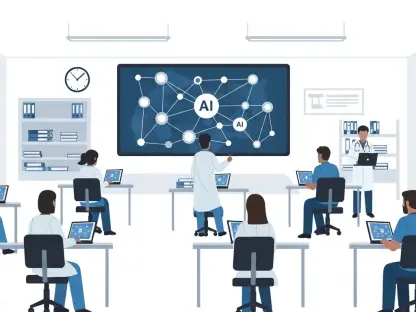The digital health sector is on the brink of a monumental transformation, driven by advancements in integrated care systems and the rapid evolution of artificial intelligence (AI). As we approach 2025, experts in health technology foresee a future where data-driven insights, seamless care integration, and AI-driven innovations will fundamentally redefine healthcare delivery. The anticipated advancements and challenges in the digital health sector are varied and complex, encompassing key themes such as digital transformation, integrated care, cybersecurity, leadership, startups, AI, and smart health.
Digital Transformation: The Data-Driven Future
The importance of data in driving healthcare transformation is a common thread among industry experts. Markus Bolton of Graphnet Health emphasizes that population health data can play a critical role in predicting, preventing, and managing health issues. This focus on data signifies a broader shift from hospital-centric to community-based care and a transition from analog to digital solutions. Furthermore, there is an increasing emphasis on preventive care over traditional treatment models. Paul Volkaerts of Nervecentre points out the financial pressures driving the adoption of digital technologies, stressing that business cases for these technologies must deliver on their productivity promises. Investments in technology are expected to yield tangible benefits that positively impact healthcare outcomes.
Digital transformation also necessitates a flexible, agile, and sustainable infrastructure. Jason Jones from Rackspace Technology underscores the importance of private cloud solutions in delivering this required infrastructure, enabling healthcare systems to adapt swiftly and securely to changing demands. Concurrently, Paul Charnley from St Vincents Consulting discusses the need to stabilize and optimize Electronic Patient Records (EPRs). Integration of digital tools into broader transformational efforts is essential, and this ongoing transition from analog systems to digital solutions is expected to solidify by 2025. Such a transition is pivotal not only for effective healthcare delivery but also for the overall improvement in healthcare service quality and efficiency.
Integrated Care: Bridging the Gaps
Integrated care systems are seen as fundamental to creating a more efficient and responsive healthcare system. Steve Wightman of The Access Group calls for the elimination of siloed technology solutions and advocates for promoting ecosystems that enable integrated care across the NHS and social care sectors. The emphasis is on linking digitization efforts with other technology strategies and preventative care initiatives. Such integration aims to create a seamless care continuum that benefits both healthcare providers and patients. Dr. Rachael Grimaldi of CardMedic adds that genuine reform is necessary to bridge the disconnect between clinical needs and operational capabilities, advocating for changes that benefit SMEs and innovators.
Charlotte Donald from Cera highlights the necessity of digitizing health and social care integration. She points out that sharing patient health data can significantly improve care quality while simultaneously reducing costs and alleviating pressure on the NHS. The effective use of AI in health and social care reformation is another critical factor. By integrating AI technologies, care systems can facilitate more streamlined and efficient care delivery processes, enhancing overall patient outcomes. This integration effort is not just about technology but also about ensuring that the human element of care is not lost in the process. It includes addressing cultural and operational shifts necessary to adapt to these new systems.
Cybersecurity: Safeguarding Health Data
As the digital health sector grows, so too does the threat landscape. Cybersecurity is a pressing concern, with the healthcare sector becoming an increasingly attractive target for cybercriminals. Chris Scarisbrick of Sectra and Chris Clinton of Naq both forecast tighter cybersecurity requirements and greater scrutiny of suppliers’ security statuses. These tighter requirements are essential to safeguard sensitive health data from sophisticated cyber threats. Leon Lerman of Cynerio calls for global regulatory advancements and insists on the need for modern security solutions like Network Detection and Response for Healthcare (NDR-H). Hospitals and healthcare providers must adopt these technologies to protect against potential attacks.
The healthcare sector faces an increasing frequency and sophistication of cyber threats, necessitating enhanced cybersecurity measures across all areas. From primary care facilities to suppliers, stringent cybersecurity protocols are paramount. These measures include proactive management of cyber credentials throughout the supply chain and the adoption of robust security frameworks. Cybersecurity is not only about technology but also about fostering a culture of security awareness within healthcare organizations. As cyber threats continue to evolve, so must the strategies and tools used to combat them, ensuring the protection of healthcare infrastructure and the safety of patient data.
Leadership and Teams: Driving Change
Strong and effective leadership is indispensable for navigating the complexities of long-term healthcare process changes. Lawrie Kidd of DrDoctor emphasizes the necessity for leaders to prioritize strategic decisions and develop clear roadmaps for innovative solutions. Such leaders are essential to balance the dual objectives of clinical and operational needs while steering the digital transformation of healthcare. Leaders must also foster a culture of innovation and adaptability within their organizations to ensure that new technologies are seamlessly integrated into existing workflows.
Phil Bottle from SARD addresses the need for detailed management information to inform strategic decisions around capacity and demand. This approach helps balance productivity with patient safety and staff wellbeing, ensuring that healthcare providers can adequately meet the demands placed upon them. Data-driven decision-making and the close integration of planning and operational functions are critical components of successful digital health initiatives. Strong leadership is not only about guiding the adoption of new technologies but also about ensuring that these technologies enhance overall healthcare delivery, improving outcomes for patients and healthcare providers alike.
Startups: Scaling Innovations
The ability of startups to scale their innovations to support the NHS is a focal point for the future of digital health. Dr. Mark Ratnarajah of C2-Ai stresses the importance of the wider adoption and scaling of innovative technologies that have demonstrated their value in clinical settings. Startups require support to ensure that their solutions can be rapidly and widely deployed, benefiting all patients and addressing broader healthcare challenges. This need for scalability is crucial for delivering on the potential of innovative technologies to transform healthcare delivery.
Dave Burrows of Damibu highlights the importance of addressing health inequalities through technology. Personalized digital solutions that cater to diverse populations are essential to address health inequities and ensure that all patients receive high-quality care. Dr. Chris Evans from Little Journey discusses the incremental yet significant role that AI can play in transforming healthcare. Ethical data use, algorithm transparency, and practical integration into clinical workflows are paramount for unlocking the potential of AI in healthcare. By focusing on these principles, innovative startups can drive significant improvements in healthcare delivery.
AI and Data: Revolutionizing Healthcare
AI and data are poised to revolutionize healthcare by 2025. Jacob West of Microsoft UK envisions AI breakthroughs that will dramatically change and augment work and life, with generative AI being a key enabler. These AI applications will focus on refining existing tools and processes rather than completely overhauling them, emphasizing safe and effective integration into clinical workflows. Responsible AI frameworks ensuring ethical use will become increasingly crucial as AI technologies continue to evolve and become more prevalent in healthcare settings.
Rhett Alden of Elsevier predicts that AI will play an increasingly significant role in digital transformation and healthcare productivity. By streamlining access to high-quality reference data and enabling personalized treatment options, AI can enhance clinical decision-making and patient outcomes. The ethical use of AI, driven by robust governance structures, is essential to ensure that these technologies benefit patients and healthcare providers alike. As AI continues to advance, its applications in healthcare will focus on enhancing existing tools and processes, ensuring that technological innovations lead to tangible improvements in healthcare delivery.
Smart Health: Enhancing Patient Care
The digital health sector is poised for a groundbreaking revolution, fueled by advancements in integrated care systems and the swift progress in artificial intelligence (AI). As we near 2025, health technology experts predict a future where data-driven insights and seamless care integration become the norm, fundamentally reshaping healthcare delivery. AI-driven innovations are expected to play a crucial role in this transformation, ushering in an era of smart health solutions.
The anticipated changes and challenges within the digital health landscape are multifaceted and intricate. Key themes include digital transformation, where healthcare providers will increasingly rely on technology to enhance patient care and streamline operations. Integrated care will become more prominent as different healthcare services collaborate to offer holistic patient care. Cybersecurity will be of paramount importance, protecting sensitive patient information from potential threats.
Leadership within the sector will need to adapt, guiding organizations through this complex digital transition. Startups and innovative companies will play a significant role, driving forward new ideas and technologies. Overall, the synergy of AI and smart health technologies will be pivotal in shaping the future of healthcare, setting the stage for improved patient outcomes and more efficient healthcare systems.









